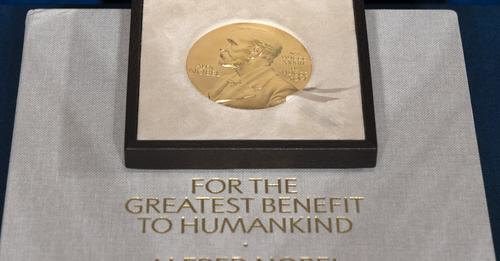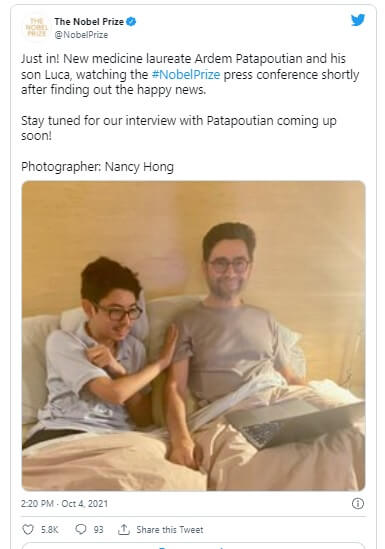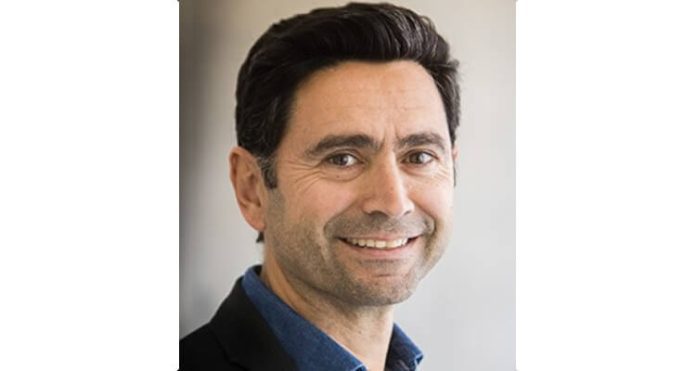By GARY ROBBINS,
JONATHAN WOSEN
Ardem Patapoutian nearly didn’t receive the call from Stockholm; he’d turned his phone off

Ardem Patapoutian, a Lebanese immigrant who escaped civil war in his own country and became a masterful neuroscientist at Scripps Research in La Jolla, was chosen Monday to share the 2021 Nobel Prize in physiology or medicine for helping to discover skin receptors that enable people to sense heat, cold, pain, touch and sound.
Patapoutian will share the gold medal and $1.14 million in prize money with his long-term collaborator, David Julius, a physiologist at the University of California San Francisco.
The discovery, made in what Patapoutian has called “an ignored part of biology,” is essential to human life, enabling a person to do everything from feel pain in their knuckles on a bitter cold day to instantly gauging the temperature of a fresh cup of coffee.
Or as he put it in a 2018 speech, “We rely on our five senses to make sense of our environment … Your sense of touch is amazing. You can sense an indentation about a 1,000 times thinner than a human hair.”
Scientists say the discovery also sheds light on the nature of the human nervous system, which in turn could help with the treatment of numerous diseases, from chronic pain to heart disorders and possibly mental health.
That’s of special interest at Scripps Research, which does both basic and applied research. Its scientists helped develop Humira, which treats such things as arthritis, Crohn’s disease and ulcerative colitis. And they’re working on Ozanimod, a drug to fight multiple sclerosis and ulcerative colitis.
Patapoutian, who lives in Del Mar, nearly missed the call from the Nobel committee.
“I had my iPhone on mute so I could sleep as I do every night so I missed a bunch of calls from Stockholm,” he told reporters during a Zoom call.
“They somehow got a hold of my 94-year-old father, who lives in Los Angeles. Even if you have ‘do not disturb’ people in your Favorites (group) can call you. So my dad called me and let me know, which ended up being a very special moment.”
Patapoutian was moved by the announcement, saying on Twitter: “This country gave me a chance with a great education and support for basic research. And for my labbies and collaborators for partnering with me. So glad @NancyAHong captured this ‘touching’ moment.”
He was referring to a photograph that was taken showing him and his son Luca watching the Nobel Prize press conference on a laptop.

The Nobel committee said in a statement that the work of Patapoutian and Julius has “unlocked one of the secrets of nature by explaining the molecular basis for sensing heat, cold and mechanical force, which is fundamental for our ability to feel, interpret and interact with our internal and external environment.”
The Academy added that prior to the breakthrough, “Our understanding of how the nervous system senses and interprets our environment still contained a fundamental unsolved question: How are temperature and mechanical stimuli converted into electrical impulses in the nervous system.”
Peter Schultz, the chief executive officer of Scripps, said, “The Nobel Prize is wonderful recognition of these discoveries. I have followed Ardem’s career closely since he first came to Scripps Research and can say that he is an extraordinary scientist, mentor, and colleague and a wonderful person.”
The research partners also won the 2020 Kavli Prize in Neuroscience for discovering how our bodies sense pressure, essential to our sense of touch and the function of cells in the heart and other organs.
The prizes have been awarded every two years since 2008, and are named after physicist, entrepreneur and philanthropist Fred Kavli. The Kavli Foundation, based in Los Angeles, has an endowed neuroscience institute at UC San Diego.
The Nobel Committee said that it had reached both men by phone early Monday and that Patapoutian, 54, and Julius, 65, were surprised and excited to learn that they had won the highest prize in science.
Monday’s announcement comes 10 years after another Scripps Research scientist, Bruce Beutler, won the Nobel Prize in medicine for his insights about how the immune system quickly spots enemies and sometimes turns on itself.
In 2001, Scripps’ researcher Barry Sharpless won a Nobel in chemistry for his work on catalysts, which are essential in drug development. Some scientists thought he would win a second Nobel this week for finding ways to more efficiently develop molecules, an important aspect of drug development.
Scripps Research issued a statement before dawn Monday, saying, “We are delighted that Dr. Patapoutian has received the Nobel Prize for his groundbreaking work on the mechanisms underlying touch. We’re looking forward to celebrating this well-deserved honor with him at Scripps Research in the coming days.”
The Union-Tribune profiled Patapoutian last year, saying that he has been on a long journey that began in Beirut, where he was born the youngest of three children in a family with Armenian roots. His mother was an elementary school teacher and his father a writer and accountant.
Patapoutian grew up during the Lebanese Civil War, which began in 1975 and ultimately killed over 100,000 people. He was once captured by armed militants and afterward moved to Los Angeles, where he studied at UCLA and fell in love with molecular biology.
“I came here with very little money and hardly spoke the language,” said Patapoutian at the time. “I worked in a lab and just fell in love with doing research. Ever since then, this has been my life and joy.”
When asked to reflect on his childhood in Lebanon, Patapoutian told the Union-Tribune, “I certainly could not have imagined this day. I could not have imagined living a life of science … I didn’t know that was a career.”
He earned a bachelor of science in biology at UCLA in 1990 and a doctor of philosophy in biology at Caltech in 1996. Patapoutian then became a postdoctoral fellow at at UC San Francisco, where he worked until 2000, when he moved on to Scripps Research, one of the nation’s most highly ranked non-profit biomedical research institutes.
Patapoutian’s team at Scripps began tackling a question he’d first pondered while at UCSF: What allows our bodies to sense pressure in all its forms, from the prick of a needle to a full belly after dinner?
Researchers had a clearer understanding of how sight and taste worked, with electrical signals pinging the brain once light hits the back of the eye or once receptors in the nose and tongue recognize chemicals from a meal. Touch and pressure, however, remained a mystery. To unravel it, postdoctoral researcher Bernard Coste grew a line of cells in Patapoutian’s lab that produced little zaps of electricity when poked. He then disabled genes in these cells to find which ones were essential for the touch response.
The painstaking work uncovered two genes, which the researchers called PIEZO1 and PIEZO2. They found that these genes were shared across mammals, including people, and that mutations have been associated with cardiomyopathy, a disease in which weakened heart muscles struggle to pump blood throughout the body, and in degenerative diseases of the spine.
Understanding the cellular workings behind these diseases is a key first step to developing new treatments against them. Patapoutian is already working with Calibr, the drug development division of Scripps Research, to quickly screen thousands of small molecules for their ability to control PIEZO1 or PIEZO2.
His collaborator, David Julius, discovered the TRPV1 receptor, which senses heat, through lab experiments that tested how cells respond to capsaicin — the same molecule that’s jam-packed into chilis. Julius later found that this receptor was also activated by high temperatures, inflammation and low-oxygen conditions, such as during a stroke.
“One of the beautiful things about basic science is that it takes you in directions that you never anticipate,” Patapoutian said during the Monday morning Zoom call with reporters. “There’s a long way ahead of us to figure out what indications this could be useful for as well as actual treatments that we could develop.”

